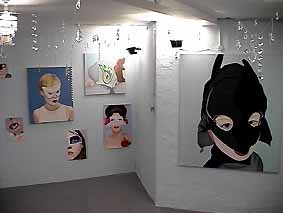Phantoms of Unease (Reflections on glamour, fetish and transformation)
Alleyoops: Cathy Lomax
Transition Gallery
110a Lauriston Road London E9,
7 Feb – 2 March 2003
“So I turned myself to face me
But I’ve never caught a glimpse
Of how the others must see the faker
I’m much too fast to take that test”
Changes – David Bowie
On entering the gallery (through a narrow corridor) the viewer is confronted by a full-length mirror which inadvertently screams. The effect is disconcerting, inducing a slight gasp which literally makes the viewer take a step back (in skateboarding terms alleyoops means to skate backwards) this feeling of being “tripped up” or caught in the site of unknowing is further explored in the main room of the gallery which is filled with various portraits of masked figures. They range from paintings of children1 to images taken from fashion magazines (Blitz Girl, Fashion Girl, Wonder Girl) to the more sinister Fetish Girl (with all the inherent connotations of sexual deviance and to the music hall grotesque of Victorian pornography in The Deadly Phantom The titles suggest both a secret anonymity (the exotic pseudonyms of call girl cards) and the comic book potentiality of the superhero. The what if pretending of multiple personality. These figures guard their secrets behind their masks.
The walls in the gallery have been painted a steely grey which adds both to a feeling of containment (these faces are locked forever in the mausoleum of their painted frames) and to dislocation, the figures float in their own hypnagogic phantasmagoria. Vintage chandelier crystals hang from the ceiling, disrupting the solidity of the painted frames whilst a barley audible soundtrack of glass tinkling replays a manic cacophony of hallucination.2
In Alleyoops we are in the “upside down world” of subjectivity, where nothing is quite as it seems. In Phantoms of the Brain (Human nature and the architecture of the mind)3 VS Ramachandran, reflects on the nature of personality and surmises that “Everything I have learnt from an intense study of ‘normal’ people and from patients who have substantial damage to various parts of their brain, points to an unsettling notion that you can create your ‘reality’ from mere fragments of information, that what you see is a reliable but not always accurate representation of what exists in the world”.
Thus, the mirror screams out its refusal of reflection and repositions the desiring abracadabra of fascination4. But this scream is also the scream of adulation, the teenagers’ scream of idol identification the lure of a dip into the pool of promised glamour.
This kinaesthetic twinkling world of tacky magic is haunted by the ghost of its own melancholia. Like the beautiful Orpheus’ catastrophic gaze as he ascended from the underworld, looking back he was lost for ever, the spell was broken.
1: The painting Sick Boy delineates that “indecisive moment” of a photograph which never makes it to the family album, the bleary eyes of a poorly eight year old hidden behind an oversized “lone ranger” mask, In Cat Boy Lomax paints a kind of goofy anthropomorphic figure (boy becoming animal)
2: Marina Warner - The Inner Eye (Art Beyond the Visible), The South Bank Centre - 1996 (a national touring exhibition organised by the Hayward Gallery).
Warner follows her introductory essay in this catalogue with a short dictionary in which are explained some of the principal manifestations and exponents of the Inner World that is her subject:
“Hallucination: distinguished from illusion in that its subjects while materially absent, are true cognitive experiences overpowering the capacity to discriminate between fantasy and reality.”
3: VS Ramachandran, Sandra Blakeslee, Phantoms in the Brain and Architecture of the Mind - 1998, fourth Estate Limited.
4: The word fascination has an origin in Latin for casting a spell by visual means (as does the word glamour)
Alex Michon

No comments:
Post a Comment